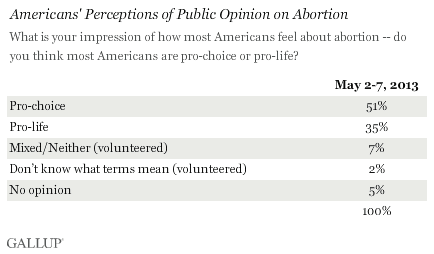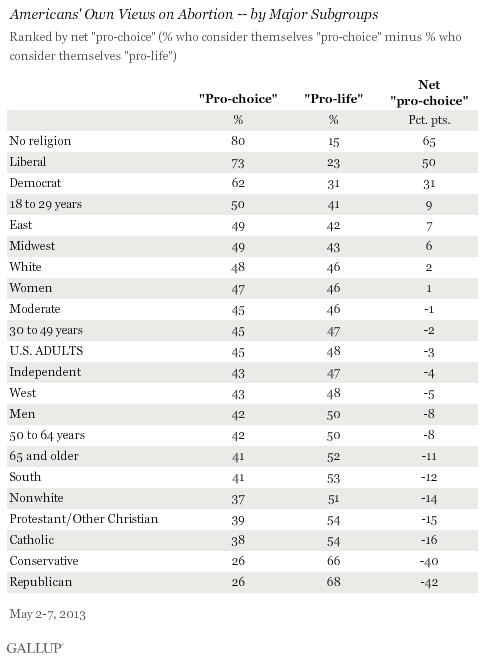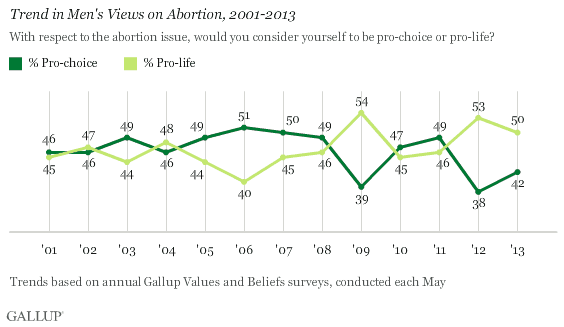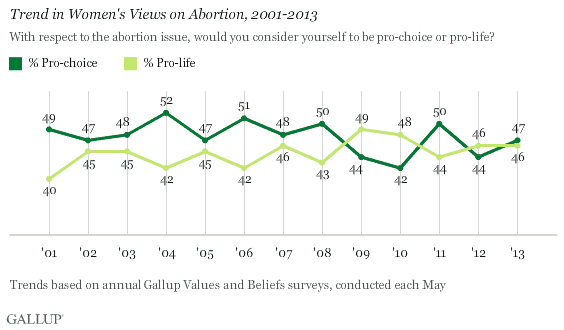PRINCETON, NJ -- When asked how they think most Americans feel about the abortion issue, 51% of U.S. adults say the public is mostly "pro-choice," while 35% say "pro-life." This general perception that the pro-choice viewpoint prevails contrasts with the nearly even division of Americans' actual views. The same poll finds that 48% of Americans call themselves pro-life and 45% pro-choice.

Political moderates are the most likely among major demographic and political subgroups to believe the pro-choice position dominates nationally. They are closely followed by "pro-choice" Americans, Westerners, Democrats, and nonwhites. Republicans, conservatives, and "pro-life" Americans are the only groups that are about evenly split in their perceptions of which abortion viewpoint is the more prevalent. No group mostly sees pro-lifers as dominant.

These findings are from Gallup's 2013 Values and Beliefs poll, conducted May 2-7 with 1,535 national adults.
Abortion Leanings Vary Widely Across Groups
As Gallup reported last week, Americans have, for the most part, been closely divided since 2009 in their personal identification as either pro-life or pro-choice. However, the balance of these views varies sharply among demographic and political groups.
Americans who profess no religious identity are the most heavily pro-choice, at 80%, with 15% calling themselves pro-life. This group is followed by liberals and Democrats, among whom pro-choicers outnumber pro-lifers by at least 2-1.
The strongest pro-life skew is found among Republicans and conservatives, of whom about two-thirds are pro-life. Slight majorities of Catholics, Protestants, nonwhites, Southerners, and seniors are also pro-life.
Gallup finds less than 10-percentage-point differences separating the pro-choice and pro-life camps in all other major subgroups, including political independents, moderates, men, women, young adults, middle-aged adults, and residents of the East, Midwest, and West.
Current views of men and women are similar to what Gallup found a year ago. (See page 2 for trends by gender.)

Bottom Line
For several years now, neither the pro-choice nor the pro-life label has been dominant among Americans. Nevertheless, 51% of Americans perceive that most Americans are pro-choice -- slightly more than the 45% personally taking the pro-choice stance. Barely a third of Americans, 35%, think most Americans are pro-life, considerably less than the 48% who are pro-life.
While Americans overestimate the strength of the "pro-choice" position, the same poll found them vastly underestimating the degree to which their fellow Americans support gay marriage. In other words, on abortion they think society is more liberal than it is; on gay rights, they think society is more conservative than it is. This seeming contradiction might be explained in terms of timing, as on both issues, Americans' perceptions of public opinion are merely a few years out of date. As recently as 2006, and routinely prior to 1998, the majority of Americans called themselves "pro-choice." And until 2011, the majority opposed gay marriage.
While it is unclear what impact Americans' current perceptual errors might have on their behavior or on public policy relative to abortion and gay rights, it is possible their perceptions will catch up with reality if current attitudes are sustained for any length of time.
Survey Methods
Results for this Gallup poll are based on telephone interviews conducted May 2-7, 2013, with a random sample of 1,535 adults, aged 18 and older, living in all 50 U.S. states and the District of Columbia.
For results based on the total sample of national adults, one can say with 95% confidence that the maximum margin of sampling error is ±4 percentage points.
Interviews are conducted with respondents on landline telephones and cellular phones, with interviews conducted in Spanish for respondents who are primarily Spanish-speaking. Each sample of national adults includes a minimum quota of 50% cellphone respondents and 50% landline respondents, with additional minimum quotas by region. Landline telephone numbers are chosen at random among listed telephone numbers. Cellphone numbers are selected using random digit dial methods. Landline respondents are chosen at random within each household on the basis of which member had the most recent birthday.
Samples are weighted to correct for unequal selection probability, nonresponse, and double coverage of landline and cell users in the two sampling frames. They are also weighted to match the national demographics of gender, age, race, Hispanic ethnicity, education, region, population density, and phone status (cellphone only/landline only/both, cellphone mostly, and having an unlisted landline number). Demographic weighting targets are based on the March 2012 Current Population Survey figures for the aged 18 and older U.S. population. Phone status targets are based on the July-December 2011 National Health Interview Survey. Population density targets are based on the 2010 census. All reported margins of sampling error include the computed design effects for weighting.
In addition to sampling error, question wording and practical difficulties in conducting surveys can introduce error or bias into the findings of public opinion polls.
View methodology, full question results, and trend data.
For more details on Gallup's polling methodology, visit www.gallup.com.

